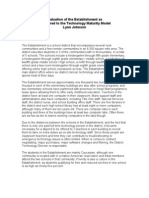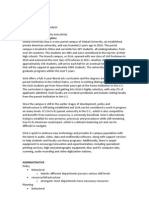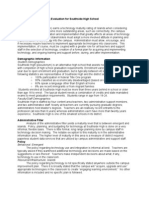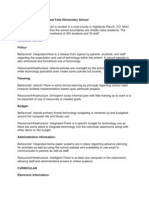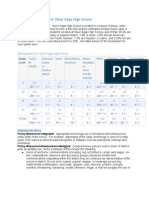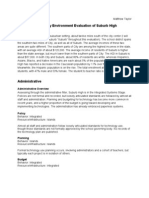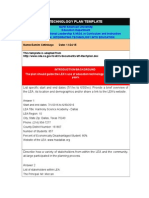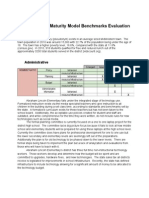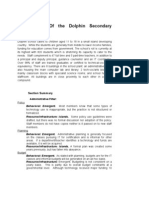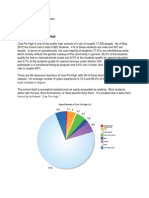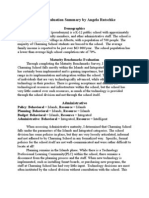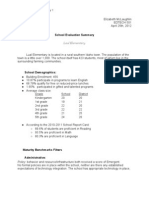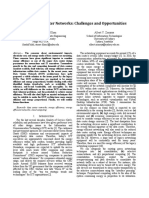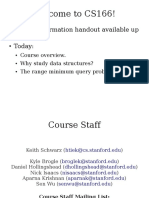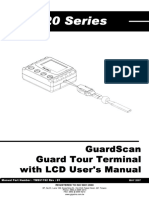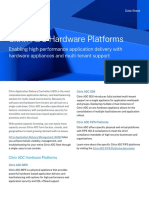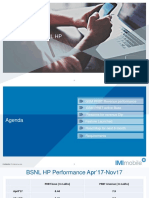School Evaluation Summary
School Evaluation Summary
Uploaded by
bkvolkCopyright:
Available Formats
School Evaluation Summary
School Evaluation Summary
Uploaded by
bkvolkOriginal Description:
Copyright
Available Formats
Share this document
Did you find this document useful?
Is this content inappropriate?
Copyright:
Available Formats
School Evaluation Summary
School Evaluation Summary
Uploaded by
bkvolkCopyright:
Available Formats
F aculty and S taff
Evaluation Summary for Madison Falls College
Madison Falls College (MFC) is located in Madison Falls, Idaho. Madison Falls is the second Faculty largest town in the region, with a 2010 Census population of 31,894. The campus draws students Adjunct Faculty from Madison Falls and the surrounding smaller communitiesseveral towns with populations Professional Staff of less than 1,000. They also offer three outreach centers in outlying areas as well as online Classified Staff classes. MFC was founded in 1893 and sits on what is known as normal hill. The MCF campus has 43 acres and 570,000 square feet of buildings. Although some of the older architecture remains MCFsuch as the campus clock towertheretohave campus willrecent renovations including a new S and science building. Visitors the been many be charmed by its brick buildings, tudents nursing Race/Ethnicitywater features as well as its rows of dogwood trees. sculptures and In the fall 2012 semester,American Indian or MFC enrolled 4,525 students. The athletic culture of the collegeas Alaska Native well as its Institute for English Learningdraw students from all over the country and the world. In the 2012 fall semester,Asian students came from 30 states and 29 different countries. Of these students, 2,712 or about 60% were female. The charts to the left break the student body down Black or African both in terms of ethnicityAmerican as age. You should be able to hover your mouse over the charts as well to see the specific percentage associated with each pie piece.
Hispanic/Latino White
The college has both academic and professional-technical divisions. The Academic division is comprised of Business, Education, Humanities, Natural Sciences, and Nursing/Health Sciences. The Professional-Technical division is comprised of Business Tech & Service and Technical & Industrial.
Ag of the drawsS the college is the very low student-faculty ratio; fall 2012 statistics report e C tudents One of MF to
that there is an 18:1 student faculty ratio. The college has 551 employees. The chart on the left Under 18 shows the breakdown of the types of employees. When students and employees are combined, there are over 5,000 individuals at Madison Falls 20-21 College. Technology plays a very important role for all of these individualsit infiltrates nearly 22-24 every aspect of college lifefrom communication, to finances, to gradesand of course, it plays 25-29 a very important role in both education and learning. But how does the technology at Madison 30-34 Falls rate? The following is an evaluation of Madison Falls Colleges technology maturity based on Peter H. R. Sibley and Chip Kimballs Maturity Model Benchmarks from the Technology Use 35-39 Plan Primer. 40-49
18-19
Maturity Model Benchmarks
Madison Falls College Administrative Filter: Islands Stage
PolicyBehavior: Integrated Stage Technology use is appropriate and embraced by administrative staff. Most functions are paperless; the conversion to a new Datatel software system allows for most administrative taskse.g. Record-keeping (data for students and vendors), finance and purchasingto be conducted electronically. Datatel filters to the students and to instructors as well. It is used and supported campus wide.
PolicyResource/Infrastructure: Integrated Stage A formal school-wide policy on appropriate technology use is in place and accessible on the MFC website. Though approved by the governing body, it is not comprehensive and does not include planning. Academic divisions have their own policies based on their own corral of equipment.
PlanningBehavioral: Islands Stage The college has a Technology Advisory Committee (TAC) comprised of members from the Faculty Senate. The committee is myopic in its focus, addressing one project at a time and not looking at the larger role of technology. For example, the TAC is currently addressing a $40,000 upgrade for the computer labs.
PlanningResource/Infrastructure: Islands Stage My research did not yield a Technology Use Plan. The colleges Strategic Plan does focus on technology in part. It appears that the TAC addresses technology needs campus-wide. Divisions also budget for technology specific to their programs. Institutional and Faculty Development grants can be written for purchase of special equipment.
BudgetBehavioral: Islands Stage Campus-wide technology needs are addressed by the TAC. These needslike the $40,000 for computer lab upgradesare brought to the attention of the Provost for approval. There is also a process for staff and instructors to apply for the (reimbursed) purchase of new technology. Any such purchase must first be approved by the Director of Internet Technology, perhaps to see the resource is available in another department. Divisions and administrative departments budget for technology based on their needs; for example, the Humanities division might not foresee the need to budget much money for technology, while Distance Learning is highly reliant on
technology and software upgrades. BudgetResource/Infrastructure Islands Stage The maintenance and support of campus-wide technological resources are budgeted for by the institution at large. However, from my review of the campus-wide 20122013 budget, specific money is not set aside for new technology. Long-termbudgetary plans are not considered.
Administrative InformationBehavioral: Intelligent Stage Technology use is required on a daily (if not hourly) basis for all administrative staff; the Datatel system is the electronic foundation of the administration and the college at large. Very few paper tasks remain.
Administrative InformationResource/Infrastructure: Intelligent Stage All staff and administrators have computers with access to the internet and to appropriate areas of Datatel. For example, not all staff will have (or will need to have) access to students records or purchasing, etc.
Curricular Filter: Integrated Stage
Electronic InformationBehavioral: Integrated Stage Faculty, staff, and students are highly dependent on electronic resources. Faculty are given Blackboard shells for their classes where they post grades online, post class announcements and handouts, etc. (not all faculty use them). Whether the shells are used or not, faculty use the internet to check email, to view their rosters, to post grades, and for advising purposes. Staff, as in the administrative filter, rely on Datatel to perform duties related to their position. Students use electronic resources to enroll in classes, check their grades, access research material on the library databasesthey can even instant message with a librarian 24/7 and, in some cases, attend virtual office hours with their instructors.
Electronic InformationResource/Infrastructure: Integrated Stage A variety of online resources are provided to MFC students. Outside of the basic
online administrative capabilities, students and staff can access various online tutorials, most on the colleges ITunes library. The list of tutorials is growing and needs better visibility for more student use. The library recently updated some of its tutorials on using the databases; I believe there could be more comprehensive online material provided on avoiding plagiarism and better support for citing sources (why cant all writing labs have websites like Purdue OWL)? The campus and the library offer mobile friendly sites; students can access Blackboard content using the Blackboard App on their phones or tablets. AssessmentBehavioral: Islands Stage As mentioned earlier, instructors are provided with Blackboard shells for classes, whether the class is taught on-campus, online, or as a hybrid. Blackboard tools mostly traditional assessment tools like tests and discussionsare used by online instructors for assessment. However, these electronic tools are not popular with oncampus classes. Blackboard tracking and report tools are not often used by online or on-campus instructors.
AssessmentResource/Infrastructure: Islands Stage Electronic evaluation of student work is available campus-wide if an instructor teaches online or opts to use a Blackboard shell. Instructors may also use off-campus means of electronic assessment, such as requiring their students to subscribe to online learning classrooms (e.g. Lynda, Atomic Learning) or subscribe to online resources that supplement many textbooks.
Curricular IntegrationBehavioral: Integrated Stage Technology, in some form, is a part of most (if not all) classes. How much depends on the class. For example, a Video Production class is heavily dependent on technology, while a literature class (traditionally) is not.
Curricular IntegrationResource/Infrastructure: Integrated Stage While technology is integrated into the curriculum, for many classes, its more of the passenger than the driver of the vehicle. In many ways, technology happens and instructors just ride along with the changes. For example, most instructors do not accept handwritten work. It is not seen as being innovative or forward thinking, but more as just rolling with the wave of technology The area of MFC that is given the most consideration when it comes to technology are the online classes. This year, the
Strategic Planning Steering Committee released a 5-year strategic plan which includes a goal to Optimize technology-based course delivery, resources, and support services for students and faculty. Teacher UseBehavioral: Intelligent Stage o Technology is integrated in the Datatel system where a teacher cannot perform his or her duties without technology. For example, a teacher cannot submit grades without a computer and the internet. Teacher UseResource/Infrastructure: Integrated Stage o All on-campus instructors are provided with computers and work areas. While the computers might not be fully updated (this is another mission of the Technology Action Committee), they have internet access and Microsoft Office. Online instructors are provided loaner laptops if needed; software like SoftChalk is provided. However, a trip to campus and to specific computers are needed for some programs. It makes sense that not all computers will have every program; however, this limitation could prevent instructors from learning new technologies that would better their instruction.
Student UseBehavioral: Intelligent Stage Students might have to research material online, type a paper, create a presentation, or even blog. The intelligent stage says they cannot meet outcomes without it and this is true.
Student Use Resource/Infrastructure: Integrated Stage On-campus students have access to computers in the colleges computer labs. If they do not have a computer, they can check out a loaner laptop. While the college does provide for its on-campus students, online studentsespecially those who do not live near campusare at a disadvantage. They must rely on their own computers and their own internet (in some geographical areas, the internet is slow and crashes often). Online students often do not have programs like Microsoft Office on their computers; Word Pad is not a technological equal.
Support Filter: Integrated Stage
Stakeholder InvolvementBehavioral: Intelligent Stage
All divisionsboth academic and technicalas well as Library Services have a representative on the 2012-2013 Technology Advisory committee. Their last meeting was on December 6th, 2012.
Stakeholder Involvement Resource/Infrastructure Intelligent Stage The Technology Advisory committee (TAC) is a part of the Faculty Senate, thus all divisions are expected to elect a representative to voice their respective needs and viewpoints.
Administrative SupportBehavioral: Integrated Stage With the TAC being part of the Faculty Senate, there is little to no involvement with the administration in terms of planning, implementation or practice (unless the technology relates directly to their positions). The administrationas seen in the TACs most recent projectoften holds the purse strings for campus-wide projects. Guest speakers, some from the administration, have been invited to speak at TAC meetings.
Administrative Support Resource/Infrastructure Islands Stage There is some support from the administration, though the support is initiated by the TAC and not by a set policy or procedure.
TrainingBehavioral: Islands Stage Many staff participate in live and online training, especially those directly related to their day-to-day use of technology. Some training is required.
Training Resource/Infrastructure Integrated Stage MFC offers online tutorials and support on Datatel and Blackboard. Additionally, the college has an online employee Training Program for all employees that offers brief online courses like Google Docs, Apps & More, Blackboard: The Personalization Principle and several live classes, too, on various topics. Classes are scheduled well into 2013. Faculty and staff are awarded points for each class and awarded small prizes in the Professional Development Recognition System. Additionally, Distance Learning offers classes on technologyusing Blackboard, SoftChalk, Camtasia Studio Lecture are examples.
Technical/Infrastructure SupportBehavioral: Integrated Stage Most staff use both formal and informal technical support to help them when a
problem arises. Two support channelsone for online classes and the other for computer/password/internet problemshelp address problems quickly and efficiently. Limited hours are a drawback. Technical/Infrastructure Support Resource/Infrastructure: Integrated Stage There are both full-and-part time personnel to help with technical support, both for online classes and general IT support. Support is available by phone or email; you can also stop in to the campus offices. Distance Learning Tech support is also available on Blackboards instant messaging tool which makes support for online students easily accessible and instant. Internet Tech Support is offered Monday Friday 8-12 and 1-5; Distance Learning Tech Support is available Monday-Friday from 730-5 and also Saturday from 9-1.
Connectivity Filter: Integrated Stage
District Area Networking (WAN)Not applicable; there is no district. Local Area Networking (LAN)Behavioral: Island Stage File sharing over the network is common in the administration, but is uncommon with students and faculty.
Local Area Networking (LAN)Resource/Infrastructure Integrated Stage The LAN is high speed.
Internet Access Behavioral: Integrated Stage Faculty, staff and students all use the internet on a regular and frequent basis. Most classes require some time on the internet whether its with research or simply emailing an instructor. Students enroll in classes on the internet and view their grades online as well.
Internet Access Resource/Infrastructure: Intelligent Stage The entire campus has high speed, wireless internet service.
Communications Systems Behavioral: Intelligent Stage Students, staff and faculty use email on a regular, if not daily, basis. Library IM use is limited, but gaining popularity. Blackboard IM, upgraded from Wimba Pronto, has seen increased student use as a means to communicate with online instructors during
virtual office hours. Communications Systems Resource/Infrastructure Intelligent Stage All students, staff, and faculty are assigned MFC email addresses. Policy is that faculty should only respond to students who use their MFC email account. In turn, this ensures that students use the MFC account for communicating with MFC instructors, advisors and staff. Other forms of communication systems include instant messaging on the Library website and Blackboard IM for online students.
Innovation Filter: Island Stage
New Technologies Behavioral: Islands Stage Staff and faculty seem more open to new technologies that present fixes to current problems; however, technologies that require more time to set up and learn (for example, shifting Powerpoint presentations to SoftChalk) though accepted, are not often implemented. Camtasia Relay, a screen capture and video recording software was piloted by eight faculty (one from each instructional division) in 2011, but has not yet been widely adopted.
New Technologies Resource/Infrastructure: Integrated Stage Even though the current focus of the TAC is on software and computer upgrades, departments are purchasing new gadgetslike IPads. In 2011, Camtasia Relay was acquired through a $43,000 ITIG grant.
Comprehensive Technologies Behavioral: Island Stage The technologies available are fairly comprehensive, but emerging resources are not yet fully understood and are thus underutilized.
Comprehensive Technologies Resource/Infrastructure: Integrated Stage There are a wide variety of technologies available throughout the college including video production equipment and lecture capture technology such as Camtasia Relay or Camtasia Studio; the videos are then published to the schools ITunes library. There are two interactive video conferencing classrooms and a recording studio.
Summary of FindingsOverall Rating and Rationale
After review, I would rate MFC at the Integrated level. The college is taking many progressive steps by providing high-speed internet access as well as up-to-date equipment to its faculty, staff, and students. Beyond the basics of internet and computers, the college is acquiring tablets and has state-of-the-art lecture capture technology. Its website as well as the librarys website are both mobile and tablet friendly. An App for the college is in development; online students are already using the Blackboard Mobile App. However, behind every piece of technology is (or perhaps isnt!) a user and behind every piece of technology is (or should be) a technology use plan and budget. These are the reasons that I did not rank the college at the Intelligent level. First, as I have learned, it doesnt matter if the technology is in place; what matters is how its used. I believe that the technologies provided can be put to better use with mandatory training and some mandatory use (such as the Blackboard shells). Second, though I was told that there is a Technology Use Plan online, I could not find it. If there is such a plan, it should be made more accessible or perhaps the administrator who told me this is confusing the TUP with a technology TLC plan which is, indeed, online. Though I understand that departments have their own budgets and can afford items like IPads, and that grants can award technologies like Camtasia Relay, a school-wide TUP needs to be in place. The Technology Advisory Committee is as close as the college gets (as far as I can see) to a TUP. This committee, to its credit, has been in place for many yearsbut with the growth of online classes and the explosion of new technologiesa larger focus on technologymore than just a Faculty Senate committeeneeds to take place for Madison Falls College to rise to the Intelligent level.
You might also like
- Pinnacle Studio 26 User GuideDocument249 pagesPinnacle Studio 26 User GuideVinicius Alves100% (3)
- 6TSRAM Cell ReportDocument15 pages6TSRAM Cell ReportpalakNo ratings yet
- MCF Students Race/Ethnicity: Evaluation Summary For Madison Falls CollegeDocument9 pagesMCF Students Race/Ethnicity: Evaluation Summary For Madison Falls CollegebkvolkNo ratings yet
- School Eval SummaryDocument9 pagesSchool Eval SummarybkvolkNo ratings yet
- Evaluation Summary For Madison Falls College: Plan PrimerDocument9 pagesEvaluation Summary For Madison Falls College: Plan PrimerbkvolkNo ratings yet
- School Evaluation Summary 3Document9 pagesSchool Evaluation Summary 3bkvolkNo ratings yet
- Maturity Benchmark EvaluationDocument6 pagesMaturity Benchmark EvaluationfjkrugerrossNo ratings yet
- School Evaluation DetailedDocument6 pagesSchool Evaluation DetailedNicole Emert ToppingNo ratings yet
- School Summary Davis CDocument9 pagesSchool Summary Davis CClark DavisNo ratings yet
- Evaluation of The Establishment As Compared To The Technology Maturity Model Lynn JohnsonDocument8 pagesEvaluation of The Establishment As Compared To The Technology Maturity Model Lynn JohnsonLynnDJJohnsonNo ratings yet
- School Evaluation: Downtown College AcademyDocument5 pagesSchool Evaluation: Downtown College AcademyjbcregerNo ratings yet
- School: Global University Asia (GUA) Institutional DemographicsDocument5 pagesSchool: Global University Asia (GUA) Institutional DemographicsBeth RussellNo ratings yet
- Evaluation TsadiMDocument6 pagesEvaluation TsadiMmarytsadiNo ratings yet
- MC Evaluation JeffreyPDocument9 pagesMC Evaluation JeffreyPpjeffreyNo ratings yet
- Educ 5324-Technology Plan - 2 ZsDocument9 pagesEduc 5324-Technology Plan - 2 Zsapi-290805552No ratings yet
- Educ 5324-sd Technology Plan TemplateDocument7 pagesEduc 5324-sd Technology Plan Templateapi-290737736No ratings yet
- Technology Maturity Evaluation: Institution: DemographicsDocument8 pagesTechnology Maturity Evaluation: Institution: DemographicsScott ChapmanNo ratings yet
- Sami Tbeileh Educ 5324-Technology PlanDocument7 pagesSami Tbeileh Educ 5324-Technology Planapi-438328462No ratings yet
- Brian Mitchell - School Evaluation: DemographicsDocument5 pagesBrian Mitchell - School Evaluation: DemographicsBrian MitchellNo ratings yet
- Evaluation Kruger RossF 1Document6 pagesEvaluation Kruger RossF 1fjkrugerrossNo ratings yet
- Evaluation PagliughiS 1Document9 pagesEvaluation PagliughiS 1Jacquelyn HeflinNo ratings yet
- Evaluation ColemanHDocument6 pagesEvaluation ColemanHHanna ColemanNo ratings yet
- Technology Plan FinalDocument10 pagesTechnology Plan FinalrustoryhufNo ratings yet
- Evaluation SalvadorPDocument5 pagesEvaluation SalvadorPPhillip SalvadorNo ratings yet
- Evaluation MillsC. 1Document4 pagesEvaluation MillsC. 1cmills26No ratings yet
- Evaluation ClarkeRDocument6 pagesEvaluation ClarkeRrclarke13No ratings yet
- Technology Environment Evaluation of Suburb High DemographicsDocument5 pagesTechnology Environment Evaluation of Suburb High DemographicsMatthew TaylorNo ratings yet
- School EvaluationDocument11 pagesSchool EvaluationjamiemenshouseNo ratings yet
- Schulz Junior High School Evaluation Summary: Institution DemographicsDocument4 pagesSchulz Junior High School Evaluation Summary: Institution DemographicsRachaelle Larsen-GrimsrudNo ratings yet
- BF High School (BFHS) EvaluationDocument9 pagesBF High School (BFHS) EvaluationkathystricklandNo ratings yet
- Evaluation SmellerMDocument4 pagesEvaluation SmellerMMatt SmellerNo ratings yet
- Thesis Document1Document51 pagesThesis Document1ericson acebedoNo ratings yet
- School and Student Description: Demographics (Based Upon Enrollment As of August 2012)Document8 pagesSchool and Student Description: Demographics (Based Upon Enrollment As of August 2012)tornduff0903No ratings yet
- Echnology: Ntroduction and AckgroundDocument5 pagesEchnology: Ntroduction and AckgroundPaulAlexisNo ratings yet
- Evaluation: Valley Elementary School DemographicsDocument5 pagesEvaluation: Valley Elementary School DemographicsangelabaezNo ratings yet
- Research Assignment 6Document8 pagesResearch Assignment 6api-301569077No ratings yet
- School Environment Evaluation: Maturity Model Benchmark FiltersDocument5 pagesSchool Environment Evaluation: Maturity Model Benchmark FiltersCatherine HolthausNo ratings yet
- Evaluation LybbertEricCDocument4 pagesEvaluation LybbertEricClybberteNo ratings yet
- Fowler Jared Siptech PlanDocument6 pagesFowler Jared Siptech Planapi-529957063No ratings yet
- Technology Maturity Model Benchmarks Evaluation: DemographicsDocument5 pagesTechnology Maturity Model Benchmarks Evaluation: DemographicsDiscordeiaNo ratings yet
- Virtual Success School DemographicsDocument8 pagesVirtual Success School DemographicstysonchaplinNo ratings yet
- Evaluation of The Dolphin Secondary School: DemographicsDocument6 pagesEvaluation of The Dolphin Secondary School: DemographicsfabspringNo ratings yet
- District Technology Training PlanDocument28 pagesDistrict Technology Training Planapi-278009007No ratings yet
- Tech Plan ReviewDocument13 pagesTech Plan Reviewapi-233629301No ratings yet
- AWebb Tech Use EvalDocument5 pagesAWebb Tech Use EvalAfton Rose ThompsonNo ratings yet
- Administrative Filter: DemographicsDocument4 pagesAdministrative Filter: DemographicsMike ProcykNo ratings yet
- Demographics: Cow Pie HighDocument6 pagesDemographics: Cow Pie HighAmyEkoMorganNo ratings yet
- School Evaluation ReportDocument14 pagesSchool Evaluation ReportzacharyfodorNo ratings yet
- Institution-South Michigan Institute of Technology and EngineeringDocument4 pagesInstitution-South Michigan Institute of Technology and EngineeringPATRICKSTIER1No ratings yet
- Evaluation - Bennettl, Summer 2012: Tech Times at Ridgemont High - Our DemographicsDocument6 pagesEvaluation - Bennettl, Summer 2012: Tech Times at Ridgemont High - Our DemographicsLinda BennettNo ratings yet
- School Evaluation Summary by Angela RutschkeDocument7 pagesSchool Evaluation Summary by Angela RutschkeAngela Weis RutschkeNo ratings yet
- Training Faculty To Use Technology in The ClassroomDocument8 pagesTraining Faculty To Use Technology in The Classroomlachimolala. kookieee97No ratings yet
- Educ 5324-Research Assignment3Document6 pagesEduc 5324-Research Assignment3api-384631795100% (1)
- Evaluation Yanowsky VDocument5 pagesEvaluation Yanowsky VVirginia Yenter YanowskyNo ratings yet
- Student Laptop Ownership Requirement and Centralization of Information Technology Services at A Large Public UniversityDocument13 pagesStudent Laptop Ownership Requirement and Centralization of Information Technology Services at A Large Public UniversityTan_Wei_Kiat_7009No ratings yet
- Learner Description: Demographics - AgeDocument12 pagesLearner Description: Demographics - AgeKyioka WhiteNo ratings yet
- Technology Environment Evaluation Summary For Towns High SchoolDocument11 pagesTechnology Environment Evaluation Summary For Towns High SchoolcjbushNo ratings yet
- School Evaluation Summary: Laul ElementaryDocument5 pagesSchool Evaluation Summary: Laul ElementaryellimclaughlinNo ratings yet
- Alford SWOT FinalDocument12 pagesAlford SWOT Finalmalcolm1911No ratings yet
- Maturity Benchmarks Survey SheetDocument4 pagesMaturity Benchmarks Survey SheetamlevangieNo ratings yet
- Charter School - Greg CorderoDocument7 pagesCharter School - Greg CorderogregcorderoNo ratings yet
- Institutional Literacies: Engaging Academic IT Contexts for Writing and CommunicationFrom EverandInstitutional Literacies: Engaging Academic IT Contexts for Writing and CommunicationNo ratings yet
- Green Data Center Networks: Challenges and Opportunities: Kashif Bilal, Samee U. Khan Albert Y. ZomayaDocument6 pagesGreen Data Center Networks: Challenges and Opportunities: Kashif Bilal, Samee U. Khan Albert Y. ZomayaSandra MinkekNo ratings yet
- Praveen Singh Pundir: Current Role DescriptionDocument5 pagesPraveen Singh Pundir: Current Role DescriptionNAGARJUNANo ratings yet
- Apmui77 UgDocument398 pagesApmui77 UgcxkamNo ratings yet
- SM-G532F Esquematico Completo Anibal Garcia IrepairDocument10 pagesSM-G532F Esquematico Completo Anibal Garcia Irepairdavid Revollo VeraNo ratings yet
- I-Sensys-Lbp325x Datasheet em Final ForwebDocument4 pagesI-Sensys-Lbp325x Datasheet em Final ForwebmorostamiNo ratings yet
- Combinatorial and Exploratory Creativity in Procedural Content GenerationDocument4 pagesCombinatorial and Exploratory Creativity in Procedural Content Generationstreamer75No ratings yet
- Analisis AI Movie Transformers (2023) by Abdul HafidDocument3 pagesAnalisis AI Movie Transformers (2023) by Abdul HafidAbdul hafidNo ratings yet
- AZURE ACCESS AND SecurityDocument20 pagesAZURE ACCESS AND Securityamit kaishverNo ratings yet
- CAC Flow ChartDocument1 pageCAC Flow ChartTahir MohamedNo ratings yet
- British Aerospace PLC Military Aircraft DivisionDocument2 pagesBritish Aerospace PLC Military Aircraft DivisionRizwanNo ratings yet
- Assignment 2 - Project Planning ReportDocument5 pagesAssignment 2 - Project Planning Report2021819044No ratings yet
- 3.SAP Retail Using FioriDocument7 pages3.SAP Retail Using FioriGirishNo ratings yet
- Analisis Dan Perbandingan Jaringan Wifi Dengan Frekuensi 2.4 GHZ Dan 5 GHZ Dengan Metode QosDocument19 pagesAnalisis Dan Perbandingan Jaringan Wifi Dengan Frekuensi 2.4 GHZ Dan 5 GHZ Dengan Metode QosNoltujuh Nollapan (Congyang)No ratings yet
- Ds AssignmentDocument3 pagesDs AssignmentSaman PaulNo ratings yet
- Stanford DsaDocument52 pagesStanford DsaSamarth GoyalNo ratings yet
- GS120 User Manual (TM951192) 5454Document24 pagesGS120 User Manual (TM951192) 5454kpo proyekNo ratings yet
- DVD Authoring Volume 1Document7 pagesDVD Authoring Volume 1Shannon Elaine SmithNo ratings yet
- Hasanuddin Sirait Artikel KomputerDocument11 pagesHasanuddin Sirait Artikel KomputerPerayaan NatalNo ratings yet
- SM-A520F W Tshoo 7 WWW - DeviceDB.XYZDocument43 pagesSM-A520F W Tshoo 7 WWW - DeviceDB.XYZTalarekwgrNo ratings yet
- Python PracticalsDocument26 pagesPython Practicalsvenkat krishnanNo ratings yet
- Tanner EDADocument22 pagesTanner EDASenthil SivakumarNo ratings yet
- Citrix Adc Hardware PlatformsDocument19 pagesCitrix Adc Hardware PlatformsRoyce MendozaNo ratings yet
- Netnode Ip Mini Mesh Radio (Plain) : Cofdm - Video, Audio Telemetry and Ip ProductsDocument3 pagesNetnode Ip Mini Mesh Radio (Plain) : Cofdm - Video, Audio Telemetry and Ip ProductsИгорь ИвановNo ratings yet
- Java Programming Set 1Document5 pagesJava Programming Set 1MagarsaaNo ratings yet
- Fuzzy Logic Controller For Controlling DC Motor Speed Using Matlab ApplicationsDocument40 pagesFuzzy Logic Controller For Controlling DC Motor Speed Using Matlab ApplicationskhananuNo ratings yet
- As ISO 14817-2004 Transport Information and Control Systems - Requirements For An ITS TICS Central Data RegisDocument10 pagesAs ISO 14817-2004 Transport Information and Control Systems - Requirements For An ITS TICS Central Data RegisSAI Global - APACNo ratings yet
- BSNL PRBT IMImobile HPDocument13 pagesBSNL PRBT IMImobile HPMithil AgrawalNo ratings yet
- CS 370-Operating SystemsDocument2 pagesCS 370-Operating SystemsZia AzamNo ratings yet









